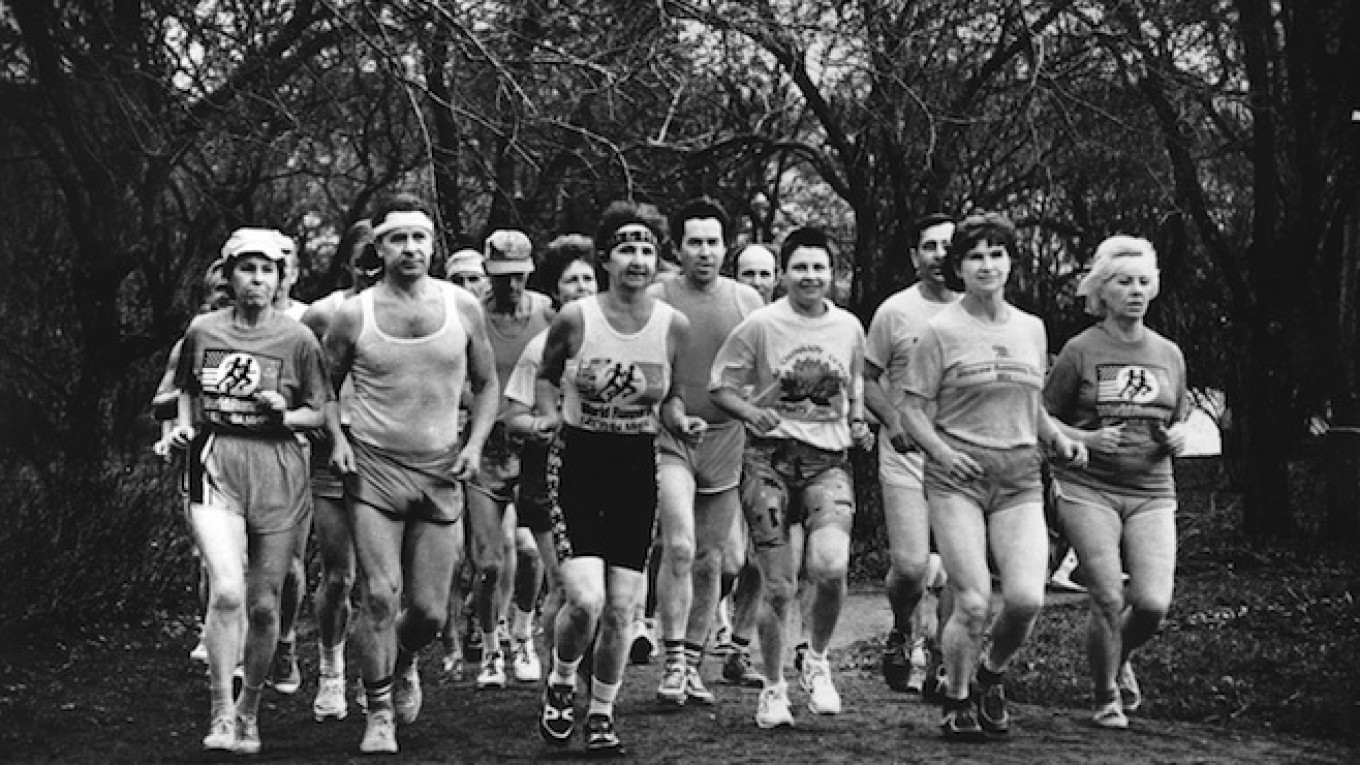Editor's note: This archive article was first published on April 30, 2010.
When he was Moscow correspondent for the New York Times, Christopher S. Wren used to take his daily run in a bright blue track suit and luminous orange jogging shoes. This not only attracted the attention of bemused Soviet citizens — but also that of the KGB.
"A television documentary warning Russians against associating with Western journalists showed some film that the secret police surreptitiously took of my daily 3-mile run through the city," Wren wrote in the New York Times in 1981. "While pretending to engage in 'physical culture,' the announcer ominously explained, I was really carrying secret messages between the United States Embassy and nefarious Russian dissidents."
Nearly 30 years later, jogging remains almost as suspect an activity.
When asked who jogs in Moscow, Kirill Vishnepolsky, editor of the Russian edition of Men's Health, laughed.
"No one. Moscow is a terrible place to jog," he said. "If foreigners jog here, I salute them, but this is a terrible place to jog."
Vishnepolsky pointed to the climate, traffic and small parks as the main obstacles. He forgot to mention the stray dogs and overfriendly locals.
Greg Walters, a former Moscow Times reporter and now a guitarist in Brooklyn-based indie rock group Red Wire Black Wire, used to jog in Chistiye Prudy when he lived in Moscow.
"If I ran through after 2 p.m., I'd get heckled by groups of men drinking beer and smoking cigarettes. A couple times, some of them sarcastically jogged along with me, laughing uproariously. They thought I was hilarious," Walters said in an e-mail.
The woman who answered the phone at the Russian Athletics Federation simply sneered. "We have nothing to do with people who just run around outside for exercise. We have athletes, professionals who run in competitions."
Peter Bridges, a Foreign Service Officer for the U.S. Embassy, is accepted as the first foreign jogger in Moscow back in 1962, and many have come since. Increasing traffic makes the city even harder to run in today, but there are many who still try.
An interactive map on the Nike Running web site shows details for a number of routes in Moscow, including one of the most popular among joggers, the embankment along Gorky Park.
A 12-kilometer run that follows one of the most polluted routes in the city, the Garden Ring, may be a joke.
The Moscow Hash House Harriers organize weekly runs with fun twists in different spots around town. The group calls itself "a drinking club with a running problem," and its Sunday afternoon runs last 40 minutes to an hour and are followed by a beer-drinking session of similar length.
Each run gathers 20 to 30 participants, expats and Russians alike, said Olesya Titarenko, an officer in the organization. The running trail is pre-marked with flour, and various game-like strategies keep marathon veterans from straying too far from walkers. Titarenko's favorite Harriers running spots include Kolomensky Park and Serebranny Bor.
"Sometimes suspicious babushkas give us strange looks, and we get some humorous remarks," Titarenko said.
Some joggers make do with smaller parks such as Kuzminki Park, Victory Park, Izmailovsky Park, Patriarch's Ponds and the territory of the Botanical Gardens.
And some people even seem to enjoy seeing runners go by.
"I'll overhear a grandparent say to his or her granddaughter, 'Look, how great, what an athlete she is,'" said U.S. Fulbright researcher Molly Thomasy Blasing, who jogs in parks near the Sokol neighborhood.
Despite not jogging, more and more Russians are running, insisted Vladimir Usachyov, who organizes public races for the Russian Athletics Foundation.
Still, the numbers remain far behind fun races and marathons in Western Europe and the United States. About 1,500 people are expected to take part in the Moscow half-marathon on May 3. Last year, according to Probeg.org, only 366 people finished the race.
Don't expect to see any of them run past you soon.
"People don't run on the streets, that's very difficult here. They run in parks or stadiums," Usachyov said.
A Message from The Moscow Times:
Dear readers,
We are facing unprecedented challenges. Russia's Prosecutor General's Office has designated The Moscow Times as an "undesirable" organization, criminalizing our work and putting our staff at risk of prosecution. This follows our earlier unjust labeling as a "foreign agent."
These actions are direct attempts to silence independent journalism in Russia. The authorities claim our work "discredits the decisions of the Russian leadership." We see things differently: we strive to provide accurate, unbiased reporting on Russia.
We, the journalists of The Moscow Times, refuse to be silenced. But to continue our work, we need your help.
Your support, no matter how small, makes a world of difference. If you can, please support us monthly starting from just $2. It's quick to set up, and every contribution makes a significant impact.
By supporting The Moscow Times, you're defending open, independent journalism in the face of repression. Thank you for standing with us.
Remind me later.






